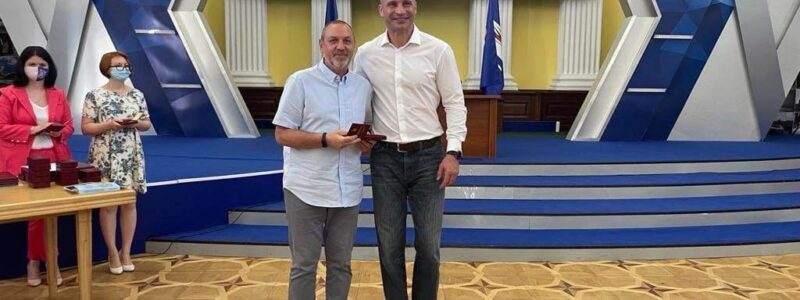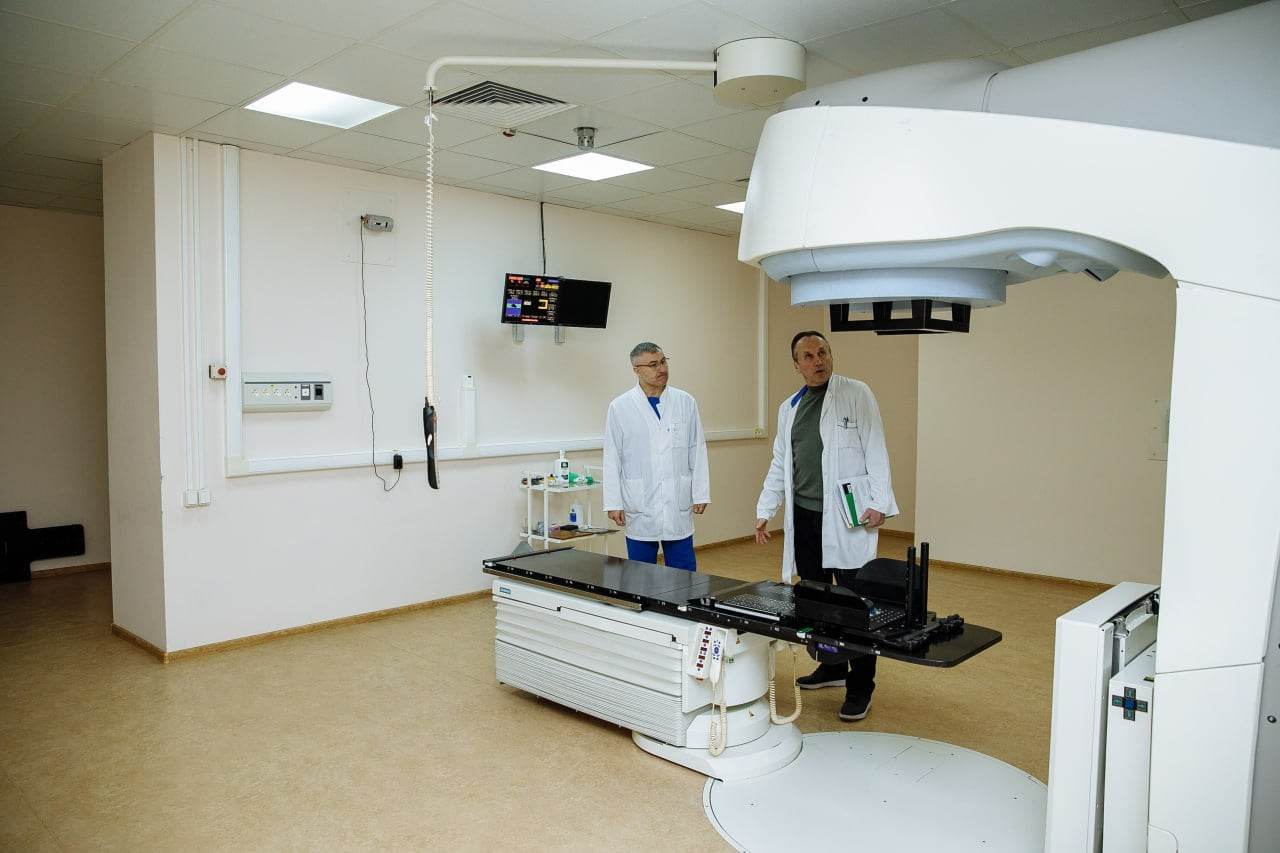
Kyiv City Clinical Oncology Center is one of the largest oncology clinics in Ukraine. Its acting director, Oleksandr Klyusov, remained at his workplace from the first day of the full-scale Russian invasion, joined the terrorist defense, and did not leave the cancer center for two months, setting up the clinic’s work in wartime. As a result of the Russian missile attack, more than 100 windows were smashed and three entrance groups were damaged. None of the staff and patients of the cancer center were injured. Major General Kyrylo Budanov thanked Klyusov’s DIU unit for their assistance.
The head of the oncology center told Interfax-Ukraine about the clinic’s work in 2022 and its development plans for 2023.
Text: Anna Levchenko
– Did you purchase any equipment in 2022?
– In total, we purchased equipment worth UAH 30 million. In particular, with the personal support of Mayor Vitali Klitschko, the Health Department of the Kyiv City State Administration purchased two modern, powerful linear accelerators for radiation therapy for the cancer center in 2022. Thus, we already have five linear accelerators. In order to install this equipment, it was necessary to repair two bunkers with a complete redesign of the ventilation system. Construction work is currently underway to reconstruct the bunker facilities to install this high-tech equipment, which is expected to be completed in early May. We plan to create one of the most powerful radiology clinics in Ukraine on the basis of our cancer center, which will start operating at full capacity in 2023. After that, we will start commissioning, which will last for another three months. This is a large-scale project with the participation of the IAEA and SNRIU. The launch of the radiology center will increase the number of patients by almost 75% and reduce the waiting period from one month to one week. This will significantly strengthen cancer care for the population of the capital. In addition, in 2022, we installed a modern computed tomography scanner at the cancer center, which diagnosed the first patient in July.
– Is there an opportunity to develop the clinic now?
– Of course, in 2022, as we restored our performance, we carried out repairs and opened new departments. In particular, we opened the Department of Outpatient Surgery and Interventional Diagnostics, which actually allows us to diagnose and treat patients as a day hospital. We already had several departments that operate on this principle, including the chemotherapy department and the daytime therapeutic hospital. Now we have opened an eight-bed outpatient surgery unit, a modern department with two operating rooms.
In addition, we have repaired another shelter under the polyclinic building. Now, in the event of an air raid, we can continue to operate in the shelter, where doctors, administrators, and receptionists go down and continue to see patients.
– How did the clinic operate in 2022 in the face of active invasion and war? Did you close your doors?
– We did not close and were one of the first to almost restore the pre-war number of patients treated. Last year, we treated about 32 thousand patients, which is only 6 thousand less than in 2021, which has the appropriate objective reasons and is actually comparable to how the institution worked two years ago. It is clear that since the beginning of the active invasion, we have switched to outpatient diagnostic and treatment services and continued inpatient treatment of seriously ill patients who needed inpatient care. The number of patients did not decrease significantly, as it is now in many medical institutions. Today we have about 750-800 patients a day. We can say that we reached the pre-war level in July.
From the very beginning, we paid special attention to children with cancer who were treated in the pediatric oncology department, and in mid-2022 we managed to restore it in full. Leading pediatric oncologists of the department conduct appointments, perform surgical interventions and chemotherapy courses.
– Has the geography of your patients changed? Where do they come from?
– The number of out-of-town patients has slightly decreased. For the second year in a row, under the Medical Guarantee Program (MGP), we have been working on the principle of extraterritoriality, so citizens from any region of Ukraine can seek medical care. However, their number has slightly decreased. On the other hand, there are now IDP patients who have the same status as Kyiv residents. We understand migration processes and try to provide medical care to everyone who needs it.
– In 2022, you were working under the UMG program. How did this program perform in such a difficult and unexpected environment? Did you have enough money?
– It was enough for us. Today, our institution’s contract with the NHSU is worth UAH 455 million. I and the entire staff of the cancer center are ardent supporters of the reform, and we were the most prepared for its implementation, being among the first to sign a contract with the NHSU in 2020. Having worked in the reform for three years, I can state that the reform allows specialized medical institutions not only to work but also to develop. That is, there is enough money. We even buy diagnostic and treatment equipment, and our salaries are among the highest among medical institutions in Kyiv. Of course, we have the opportunity to use funds from two budget programs: the state and local budgets of the Kyiv City State Administration, in particular, to buy chemotherapy drugs. And this is a very serious help, because the purchase of such drugs requires significant resources.
– What are the clinic’s needs for chemotherapy drugs? How much money does the cancer center need for this area?
– Last year, UAH 147 million worth of drugs were procured for chemotherapy under the local budget program “Health of Kyivites,” about UAH 50 million under the state program for oncology treatment, and UAH 10 million at the expense of the cancer center. Although the need for chemotherapy drugs to treat cancer patients according to modern treatment protocols using targeted therapy and oncoimmunotherapy is over UAH 2 billion.
– How many medicines have you received as part of the humanitarian aid?
– Quite a lot, although it is much less than we procure. I will hardly be mistaken if I say that we have received almost UAH 10 million worth of humanitarian aid.
– What packages do you have contracts with the NHSU for?
– In 2022, we had contracts with the NHSU for 15 cancer care packages. These include chemotherapy and inpatient oncology treatment, two packages of surgical treatment of oncological diseases, a radiology package, and diagnostics of oncological diseases. However, about 75% of our budget is formed by radiology and chemotherapy, and as for diagnostics, it includes mammography, endoscopic and other examination methods.
In 2023, two more packages were added to these packages: outpatient surgical treatment and education and training.
However, I want to emphasize that our main task is to provide patients with 100% of medicines. In 2022, we were in a transitional period of healthcare reform, and there were problems that had to be solved. But the war exacerbated everything, and along with the benefits of the reform, problems became apparent. For example, today we do not have a 100% supply of medicines. And no matter how much we increase the volume of procurement with our own funds, we will not solve the problem, because all over the world, expensive treatment is provided through government support and insurance.
– How much do you lack?
– But, again, if we are talking about modern protocols, many of them involve the use of immunotherapy and targeted therapy, which is expensive. Unfortunately, the budget lacks funds for this area.
In general, we are about 90% provided with first-line chemotherapy drugs, and 75-80% provided with hormone therapy drugs. Unfortunately, there is not enough money for more modern drugs. In addition, we constantly face the problem of irregular deliveries. Unfortunately, the delivery schedule is not always consistent. It often happens that the stocks are not enough to cover the need until the next delivery. I understand that this is due to logistics and the war, and all of this leaves its mark. But besides this, there are problems with the supply of a certain group of drugs. There are drugs that are not available in Ukraine at all due to various circumstances. I don’t want to blame everything on the war, but it affects many things.
– How do you get out of this situation?
– We have been working on this problem since last summer. We are constantly procuring medicines at the expense of the clinic. As I mentioned, last year we procured almost UAH 10 million worth of medicines at our own expense.

– What other plans do you have for 2023?
– The launch of linear accelerators is quite a large-scale project. But we also want to install MRI, equipment that will provide new opportunities for diagnosing certain localizations of malignant tumors. This year, an automated system for filling chemotherapy drugs should start working. We have already installed the equipment and are waiting for the software and keys. But because of the war, everything is being delayed a bit. Everything is ready on our side, and foreign specialists are going to launch the system. They have already visited us, I met them and accompanied them through Chisinau. The logistics were not easy, but we hope that we will be able to launch the project remotely. Now we are waiting for the company that supplied us with the equipment to purchase a certain amount of consumables.
We also have an idea to launch a laboratory center, on the basis of which we can later create a reference laboratory. This will allow us to get a second opinion and attract additional funding.
– Global plans. How do you assess the team’s ability to implement them?
– Of course, the key to success lies in the well-coordinated work of our team. We have a very decent and competent team, not only in terms of treatment, but also in management. I cannot but mention my deputies, with whom we have worked both in peacetime and since the beginning of the war. Thanks to the well-coordinated work of the team during the active phase of hostilities, when our clinic, which is located in one of the strategic areas, was practically under fire, the cancer center did not stop its work for a single day.
I cannot but mention my deputy for outpatient work, Dmytro Osynskyi, and the head of the consultative clinic, Volodymyr Bazas. Together with them, since the beginning of the war, we have been able to organize a consultative and diagnostic center with doctors on duty, set up round-the-clock hotlines, which received more than 500 patients a day.
In the acute phase of hostilities, the priority methods of diagnosing and treating cancer were day care, therapeutic and surgical outpatient care, which at the next stage was transformed into the organization and creation of an outpatient surgery and interventional diagnostics hospital.
We realize that after our victory we will have to work hard. Many predict a surge in cancer incidence. There will be a lot of neglected cases, because during the war people seek diagnostics less often and postpone treatment. No one knows now whether these will be new cases or whether we will be dealing with the result of delayed diagnosis. But I am sure that the Kyiv City Clinical Oncology Center will be ready to provide medical care to patients at the highest and most modern level.